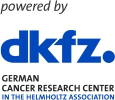Dr
Nadezda Dolgikh
(Department of Medicine III, University Medical Center, Johannes Gutenberg-University, Mainz, Germany; German Cancer Consortium (DKTK) partner site Frankfurt/Mainz and German Cancer Research Center (DKFZ) Heidelberg, Germany)
Menin inhibitors represent a novel class of targeted therapies for acute myeloid leukemia (AML), particularly in patients with KMT2A rearrangements (KMT2A-r) and NPM1 mutations (NPM1mut). These inhibitors disrupt the Menin-KMT2A complex, silencing leukemogenic gene expression, promoting differentiation, and leading to disease eradication. However, the precise mechanisms by which the Menin-KMT2A complex regulates leukemic gene expression remain incompletely understood. We hypothesized that the Menin-KMT2A complex may recruit additional protein partners to the complex that might contribute to leukemogenesis and could represent druggable targets. Using a high-resolution CRISPR/Cas9 domain scan of KMT2A and MEN1, we identified PRMT5, a putative binding site in Menin, as a strong dependency in NPM1mut AML cells. The arginine methyltransferase PRMT5 has been reported to interact with Menin, is implicated in the pathogenesis of myeloid neoplasms, and represents a promising target. CRISPR/Cas9-mediated PRMT5 knockout was lethal to NPM1mut AML cells and PRMT5 inhibition suppressed viability of various AML cells. We demonstrated that PRMT5 inhibition synergizes with Menin inhibition to reduce cell viability in KMT2A-r and NPM1mut AML cell lines and patient-derived NPM1mut AML cells. This combination induced differentiation, triggered apoptosis in vitro and reduced leukemia burden, and prolonged survival significantly in an NPM1mut AML xenograft model. RNAseq analysis revealed that Menin and PRMT5 co-inhibition suppresses Menin-KMT2A target genes and reported PRMT5 targets, including those regulated by the E2F and ATF4 transcription factors. Integration of these transcriptional data with CUT&RUN and ChIPseq analyses revealed chromatin co-occupancy of Menin and PRMT5 on a subset of the Menin-KMT2A targets loci as well as at the loci of E2F/ATF4-regulated genes. These results are consistent with a suppression of complementary pathways as a potential mechanism of drug synergy. Our findings provide a strong rationale for combining Menin and PRMT5 inhibitors in NPM1mut or KMT2A-r AML, a drug regimen already available for clinical testing.
| Research type |
Translational research
|
Dr
Nadezda Dolgikh
(Department of Medicine III, University Medical Center, Johannes Gutenberg-University, Mainz, Germany; German Cancer Consortium (DKTK) partner site Frankfurt/Mainz and German Cancer Research Center (DKFZ) Heidelberg, Germany)
Dr
Marlene Steiner
(Department of Medicine III, University Medical Center, Johannes Gutenberg-University, Mainz, Germany)
Jonas Schönfeld
(Department of Medicine III, University Medical Center, Johannes Gutenberg-University, Mainz, Germany)
Maria Alejandra Vila Molerio
(Department of Medicine III, University Medical Center, Johannes Gutenberg-University, Mainz, Germany)
Dr
Johanna Rausch
(Department of Medicine III, University Medical Center, Johannes Gutenberg-University, Mainz, Germany; German Cancer Consortium (DKTK) partner site Frankfurt/Mainz and German Cancer Research Center (DKFZ) Heidelberg, Germany)
Dr
Simon Weisemann
(Department of Medicine III, University Medical Center, Johannes Gutenberg-University, Mainz, Germany)
Aarón Gallego-Crespo
(Department of Medicine III, University Medical Center, Johannes Gutenberg-University, Mainz, Germany; Institute of Molecular Biology (IMB), Mainz, Germany)
Prof.
Matthias Theobald
(Department of Medicine III, University Medical Center, Johannes Gutenberg-University, Mainz, Germany; German Cancer Consortium (DKTK) partner site Frankfurt/Mainz and German Cancer Research Center (DKFZ) Heidelberg, Germany)
Dr
Daniel Sasca
(Department of Medicine III, University Medical Center, Johannes Gutenberg-University, Mainz, Germany; German Cancer Consortium (DKTK) partner site Frankfurt/Mainz and German Cancer Research Center (DKFZ) Heidelberg, Germany)
Dr
Chun-Wei Chen
(Department of Systems Biology, Beckman Research Institute, City of Hope, Duarte, CA, USA; City of Hope Comprehensive Cancer Center, Duarte, CA, USA)
Prof.
Michael W. M. Kühn
(Department of Medicine III, University Medical Center, Johannes Gutenberg-University, Mainz, Germany; German Cancer Consortium (DKTK) partner site Frankfurt/Mainz and German Cancer Research Center (DKFZ) Heidelberg, Germany)
There are no materials yet.

